Please fill the form to the right for a free consultation if you need an assignment/robo audit/document signature audit, or go to https://www.mortgageauditsonline.com/
An assignment of mortgage is a document which indicates that a mortgage has been transferred from the original lender or borrower to a third party. Assignments of mortgage are more commonly seen when lenders sell mortgages to other lenders. When someone has what is known as an assumable mortgage, it is possible for the borrower to transfer the mortgage to another person, in which case an assignment of mortgage will need to be filed to record the transaction.
This document indicates that the loan obligation has been transferred. It usually describes the property so that there is no confusion about which piece of real estate is under discussion. It should include the name of the original party, along with the name of the third party, with contact information and the date that the assignment of mortgage becomes valid. In the case of an assignment of mortgage between lenders, the document notes the identity of the borrower, while assumed mortgages identify the lender and indicate that the transfer took place between borrowers.
Lenders routinely sell mortgages, and in fact a mortgage may be transferred multiple times before it has been paid off. Lenders are not required to notify borrowers when they sell mortgages, and borrowers do not have an opportunity to contest the sale. The new lender is required to send out a notification indicating that a sale took place and providing information about how to make mortgage payments to the new lender. The borrower may attempt to negotiate a change in terms, or if the borrower does not want to work with the new lender, it may be possible to apply for a new mortgage to pay off the old one.
With an assumable mortgage, the issue is a bit trickier. Lenders do not want borrowers to assign their mortgages to people who cannot keep up with the payments, as then they will be faced with having to foreclose and sell the property, and this adds to the expense of servicing the loan. As a result, people who wish to assume a mortgage must demonstrate that they are financially capable of taking on the loan, and that they fully understand the terms of the loan.
An assignment of mortgage will be filed in the same government office which handles ownership records, property taxes, and related matters. People should be aware that sometimes an assignment of mortgage is not recorded for several months, especially if there is a backlog of documenting material which needs to be gone through.
If borrowers receive a notice in the mail indicating that their mortgage has been transferred, they should call their lenders to confirm the sale and ask who the mortgage was sold to. It is also advisable to check the records office to confirm that an assignment of mortgage has been followed. Borrowers should be aware that some scammers prey on people by claiming that their mortgages have been transferred when this is not actually the case.
Following via: law.justia.com
CHAPTER 701
ASSIGNMENT AND CANCELLATION OF MORTGAGES
701.01 Assignment.
701.02 Assignment not effectual against creditors unless recorded and indicated in title of document; applicability.
701.03 Cancellation.
701.04 Cancellation of mortgages, liens, and judgments.
701.041 Title insurer; mortgage release certificate.
701.06 Certain cancellations and satisfactions of mortgages validated.
701.01 Assignment.–Any mortgagee may assign and transfer any mortgage made to her or him, and the person to whom any mortgage may be assigned or transferred may also assign and transfer it, and that person or her or his assigns or subsequent assignees may lawfully have, take and pursue the same means and remedies which the mortgagee may lawfully have, take or pursue for the foreclosure of a mortgage and for the recovery of the money secured thereby.
History.–s. 1, Dec. 11, 1834; RS 1985; GS 2498; RGS 3840; CGL 5743; s. 782, ch. 97-102.
701.02 Assignment not effectual against creditors unless recorded and indicated in title of document; applicability.—
(1) An assignment of a mortgage upon real property or of any interest therein, is not good or effectual in law or equity, against creditors or subsequent purchasers, for a valuable consideration, and without notice, unless the assignment is contained in a document that, in its title, indicates an assignment of mortgage and is recorded according to law.
(2) This section also applies to assignments of mortgages resulting from transfers of all or any part or parts of the debt, note or notes secured by mortgage, and none of same is effectual in law or in equity against creditors or subsequent purchasers for a valuable consideration without notice, unless a duly executed assignment be recorded according to law.
(3) Any assignment of a mortgage, duly executed and recorded according to law, purporting to assign the principal of the mortgage debt or the unpaid balance of such principal, shall, as against subsequent purchasers and creditors for value and without notice, be held and deemed to assign any and all accrued and unpaid interest secured by such mortgage, unless such interest is specifically and affirmatively reserved in such an assignment by the assignor, and a reservation of such interest or any part thereof may not be implied.
(4) Notwithstanding subsections (1), (2), and (3) governing the assignment of mortgages, chapters 670-680 of the Uniform Commercial Code of this state govern the attachment and perfection of a security interest in a mortgage upon real property and in a promissory note or other right to payment or performance secured by that mortgage. The assignment of such a mortgage need not be recorded under this section for purposes of attachment or perfection of a security interest in the mortgage under the Uniform Commercial Code.
(5) Notwithstanding subsection (4), a creditor or subsequent purchaser of real property or any interest therein, for valuable consideration and without notice, is entitled to rely on a full or partial release, discharge, consent, joinder, subordination, satisfaction, or assignment of a mortgage upon such property made by the mortgagee of record, without regard to the filing of any Uniform Commercial Code financing statement that purports to perfect a security interest in the mortgage or in a promissory note or other right to payment or performance secured by the mortgage, and the filing of any such financing statement does not constitute notice for the purposes of this section. For the purposes of this subsection, the term “mortgagee of record” means the person named as the mortgagee in the recorded mortgage or, if an assignment of the mortgage has been recorded in accordance with this section, the term “mortgagee of record” means the assignee named in the recorded assignment.
History.–s. 1, ch. 6909, 1915; RGS 3841; CGL 5744; s. 13, ch. 20954, 1941; s. 2, ch. 89-41; s. 20, ch. 2005-241.
701.03 Cancellation.–Whenever the amount of money due on any mortgage shall be fully paid, the mortgagee or assignee shall within 60 days thereafter cancel the same in the manner provided by law.
History.–RS 1986; GS 2499; RGS 3842; CGL 5745; s. 171, ch. 73-333.
701.04 Cancellation of mortgages, liens, and judgments.—
(1) Within 14 days after receipt of the written request of a mortgagor, the holder of a mortgage shall deliver to the mortgagor at a place designated in the written request an estoppel letter setting forth the unpaid principal balance, interest due, and the per diem rate. Whenever the amount of money due on any mortgage, lien, or judgment shall be fully paid to the person or party entitled to the payment thereof, the mortgagee, creditor, or assignee, or the attorney of record in the case of a judgment, to whom such payment shall have been made, shall execute in writing an instrument acknowledging satisfaction of said mortgage, lien, or judgment and have the same acknowledged, or proven, and duly entered of record in the book provided by law for such purposes in the proper county. Within 60 days of the date of receipt of the full payment of the mortgage, lien, or judgment, the person required to acknowledge satisfaction of the mortgage, lien, or judgment shall send or cause to be sent the recorded satisfaction to the person who has made the full payment. In the case of a civil action arising out of the provisions of this section, the prevailing party shall be entitled to attorney’s fees and costs.
(2) Whenever a writ of execution has been issued, docketed, and indexed with a sheriff and the judgment upon which it was issued has been fully paid, it shall be the responsibility of the party receiving payment to request, in writing, addressed to the sheriff, return of the writ of execution as fully satisfied.
History.–s. 1, ch. 4138, 1893; s. 1, ch. 4918, 1901; GS 2500; RGS 3843; CGL 5746; s. 1, ch. 80-17; s. 15, ch. 93-250; s. 12, ch. 94-170.
701.041 Title insurer; mortgage release certificate.—
(1) DEFINITIONS.–For purposes of this section:
(a) “Mortgage” means a mortgage or mortgage lien on an interest in real property in this state, including any modifications thereof, given to secure a loan in the principal amount of $500,000 or less, other than a mortgage securing an open-end or revolving credit agreement.
(b) “Mortgagee” means:
1. The grantee of a mortgage; or
2. If a mortgage has been assigned of record, the last person to whom the mortgage has been assigned of record.
(c) “Mortgage servicer” means the last person to whom a mortgagor or the mortgagor’s successor in interest has been instructed by a mortgagee to send payments on a loan secured by a mortgage. A person transmitting a payoff statement is the mortgage servicer for the mortgage described in the payment statement.
(d) “Mortgagor” means the grantor of a mortgage.
(e) “Payoff statement” means a statement of the amount of:
1. The unpaid balance of a loan secured by a mortgage, including principal, interest, and any other charges properly due under or secured by the mortgage.
2. Interest on a per-day basis for the unpaid balance.
(f) “Record” means to record with the clerk of the circuit court or the comptroller in the county or counties in which the real property securing the mortgage is located.
(g) “Title insurer” means a corporation or other business entity authorized and licensed to transact the business of insuring titles to interests in real property in this state under chapter 624.
(2) CERTIFICATE OF RELEASE.–An officer or duly appointed agent of a title insurer may, on behalf of a mortgagor or a person who acquired from the mortgagor title to all or a part of the property described in a mortgage, execute a certificate of release that complies with the requirements of this section and record the certificate of release in the real property records of each county in which the mortgage is recorded if a satisfaction or release of the mortgage has not been executed and recorded after the date payment in full of the loan secured by the mortgage was made in accordance with a payoff statement furnished by the mortgagee or the mortgage servicer.
(3) CONTENTS.–A certificate of release executed under this section must contain:
(a) The name of the mortgagor, the name of the original mortgagee, and, if applicable, the mortgage servicer; the date of the mortgage; the date of recording; and the volume and page or document number in the real property records in which the mortgage is recorded, together with similar information for the last recorded assignment of the mortgage.
(b) A statement that the mortgage, including any modifications thereof, was in the principal amount of $500,000 or less.
(c) The name of the title insurer filing the certificate of release, a statement that the person executing the certificate of release is an officer or a duly appointed agent of the title insurer, a statement that the title insurer is authorized and licensed to transact the business of insuring titles to interests in real property in this state under chapter 624 or chapter 626, and, if executed by a duly appointed agent, shall further provide the recording information of the appointment of such agent as required by subsection (4).
(d) A statement that the certificate of release is made on behalf of the mortgagor or a person who acquired title from the mortgagor to all or a part of the property described in the mortgage.
(e) A statement that the mortgagee or mortgage servicer provided a payoff statement which was used to make payment in full of the unpaid balance of the loan secured by the mortgage.
(f) A statement that payment in full of the unpaid balance of the loan secured by the mortgage was made in accordance with the payoff statement and that a copy of the certificate of release was sent to the mortgagee or mortgage servicer that provided the payoff statement.
(4) EXECUTION.–
(a) A certificate of release authorized by subsection (2) must be duly executed, sworn to or affirmed under penalty of perjury before a notary public, and recorded and may be executed by an officer of a title insurer or by a duly appointed agent of a title insurer. Such delegation to an agent by a title insurer shall not relieve the title insurer of any liability for damages caused by the agent for the execution or recordation of a certificate of release.
(b) The appointment of an agent must be duly executed, acknowledged, and recorded by an officer of a title insurer and must state:
1. The title insurer as the principal.
2. The identity of the person, partnership, or corporation authorized to act as agent to execute and record certificates of release provided for in this section on behalf of the title insurer.
3. That the agent has the full authority to execute and record certificates of release provided for in this section on behalf of the title insurer.
(c) A separate appointment of agent shall not be necessary for each certificate of release provided that at least one such appointment is recorded in the county in which the mortgaged property is located. The appointment of agent must be rerecorded where necessary to establish authority of the agent, but such authority shall continue until a revocation of appointment is recorded in the office of the county recorder in which the appointment of agent was recorded.
(d) After recordation of a title insurer’s revocation of appointment in the office of the county recorder in which the appointment was recorded, the agent whose appointment is revoked in such county shall have no further authority to execute or record certificates of release as provided in this section on behalf of that title insurer with respect to any mortgages recorded in that county, and no such certificate of release thereafter executed or recorded by that agent on behalf of that title insurer shall be effective to release any mortgage recorded in that county.
(5) EFFECT.–For purposes of releasing the mortgage, a certificate of release containing the information and statements provided for in subsection (3) and executed as provided in subsection (4) is entitled to be recorded with the county recorder and operates as a release of the mortgage described in the certificate of release. The county recorder shall rely upon the certificate to release the mortgage. Recording of a certificate of release by a title insurer or its agent shall not relieve the mortgagor, or the mortgagor’s successors or assigns, from any personal liability on the loan or other obligations secured by the mortgage. A certificate of release recorded pursuant to this section fulfills any other obligation of the mortgagee or mortgage servicer to file a satisfaction or release of the mortgage.
(6) LIABILITY OF TITLE INSURER.–
(a) In addition to any other remedy provided by law, a title insurer recording a certificate of release under this section shall be liable to the holder of the obligation secured by the mortgage for actual damage sustained due to the recording of the certificate of release. Reasonable costs and attorneys’ fees shall be awarded to the prevailing party.
(b) The title insurer named in a certificate of release filed by a duly appointed agent shall be liable pursuant to this subsection without regard to whether the title insurer authorized the specific certificate of release recorded by the agent.
(c) The title insurer shall have no liability under this subsection if the title insurer shows that payment in full of the unpaid balance of the loan secured by the mortgage was made in accordance with the payoff statement furnished by the mortgagee or the mortgage servicer.
(d) Liability of a title insurer pursuant to this section shall be considered to be a title insurance claim on real property in this state pursuant to s. 627.7865.
(7) RECORDING.–If a mortgage is recorded in more than one county and a certificate of release is recorded in one of such counties, a certified copy of the certificate of release may be recorded in another of such counties with the same effect as the original. In all cases, the certificate of release shall be entered and indexed as satisfactions of mortgage are entered and indexed.
(8) APPLICATION.–This section applies only to a mortgage, including any modifications of such mortgage, in the principal amount of $500,000 or less.
(9) PREMIUM.–The Financial Services Commission shall adopt rules establishing an actuarially sound premium charge to be made for each certificate of release recorded pursuant to this section.
History.–s. 1, ch. 2005-122.
701.06 Certain cancellations and satisfactions of mortgages validated.–All cancellations or satisfactions of mortgages made prior to the enactment of chapter 4138, Acts of 1893, by the mortgagee or assignee of record of such mortgage entering same on the margin of the record of such mortgage in the presence of the custodian of such record and attested by the said custodian and signed by said mortgagee or assignee of record of such mortgage, shall be valid and effectual for every purpose as if the same had been done subsequent to the enactment of chapter 4138, Acts of 1893.
History.–s. 1, ch. 14763, 1931; CGL 1936 Supp. 5746(1).
FORECLOSURE MILL EMPLOYEE SIGNATURES (FORGERIES) ON ASSIGNMENT OF MORTGAGES.
______________________________________
____________
For more info on Assignment of Mortgage head Over to


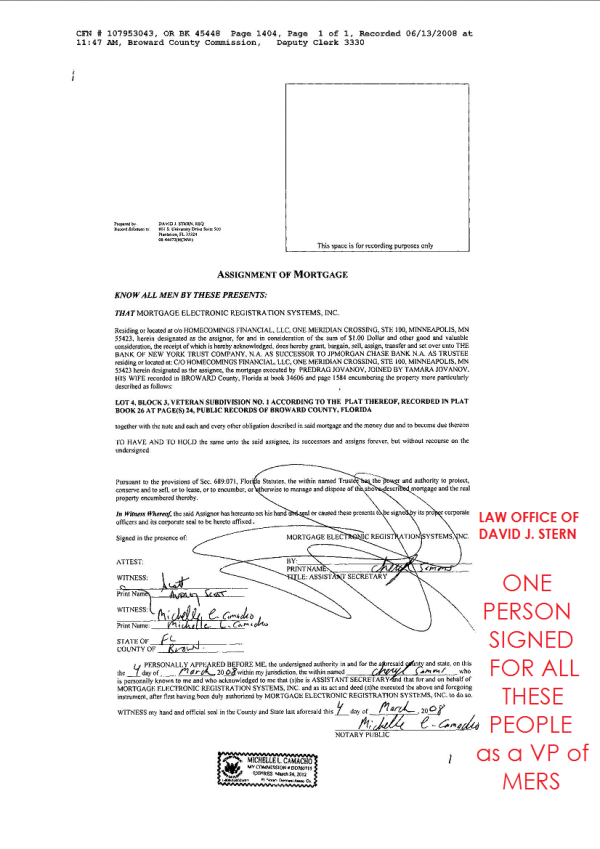
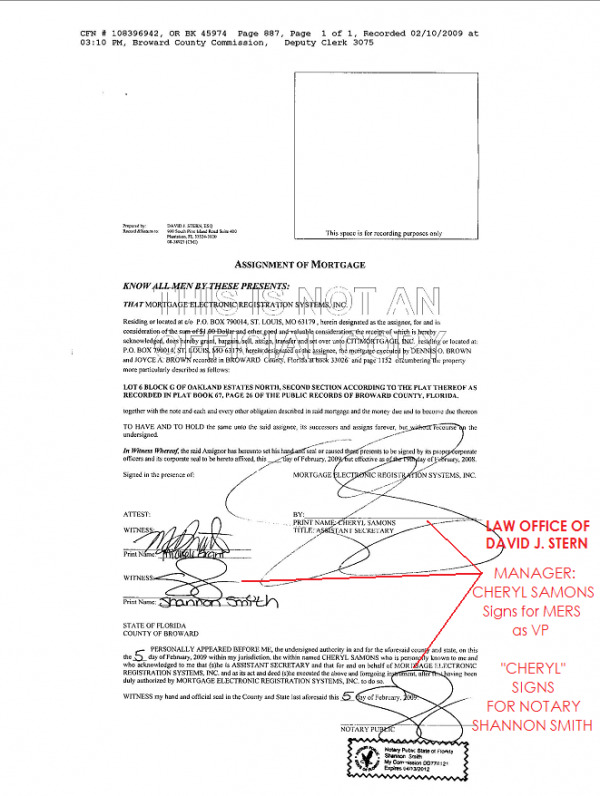
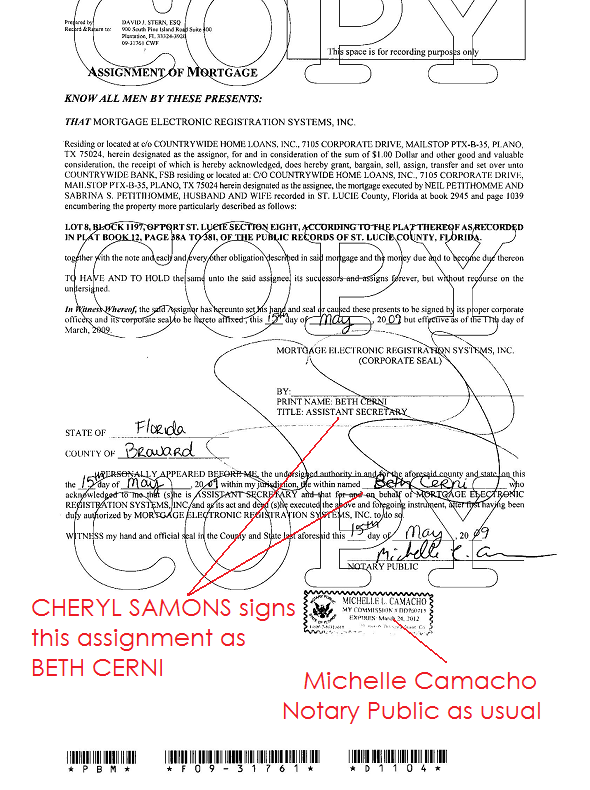
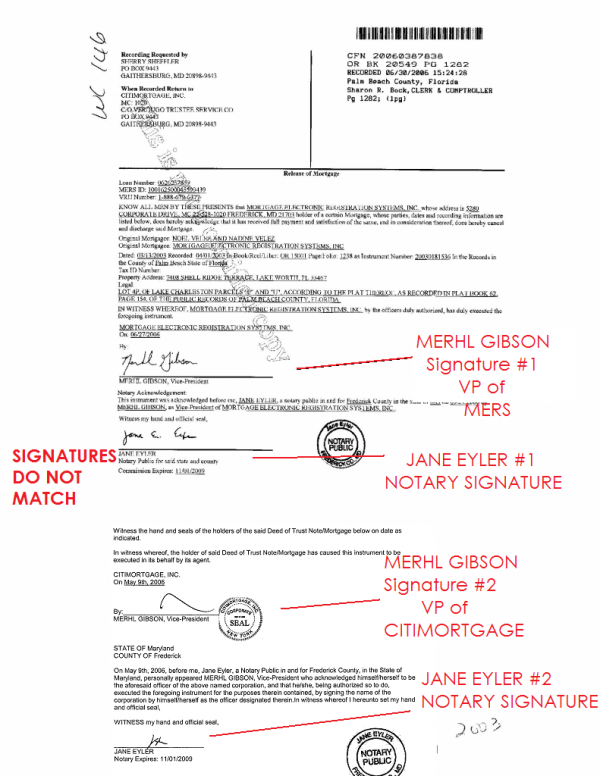
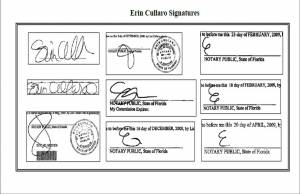
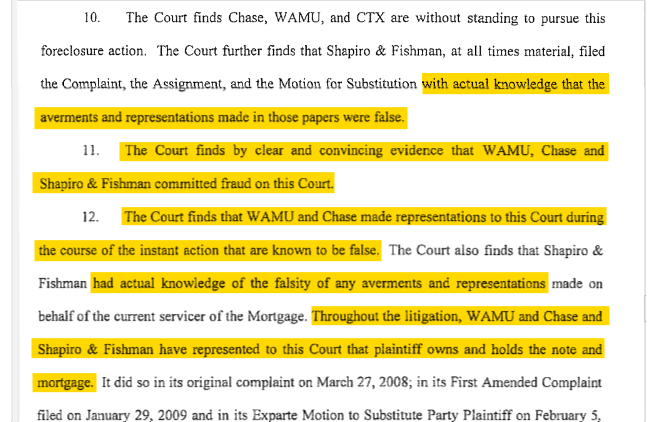
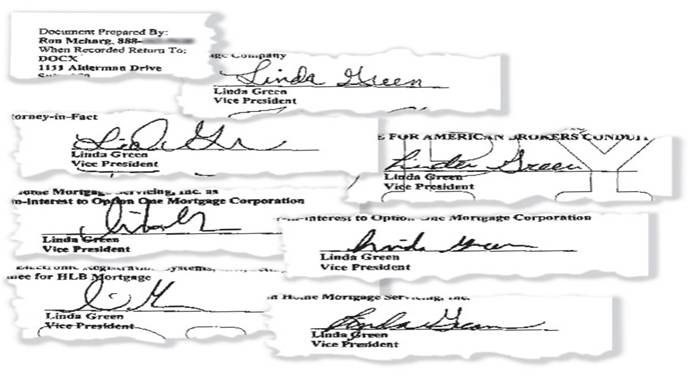
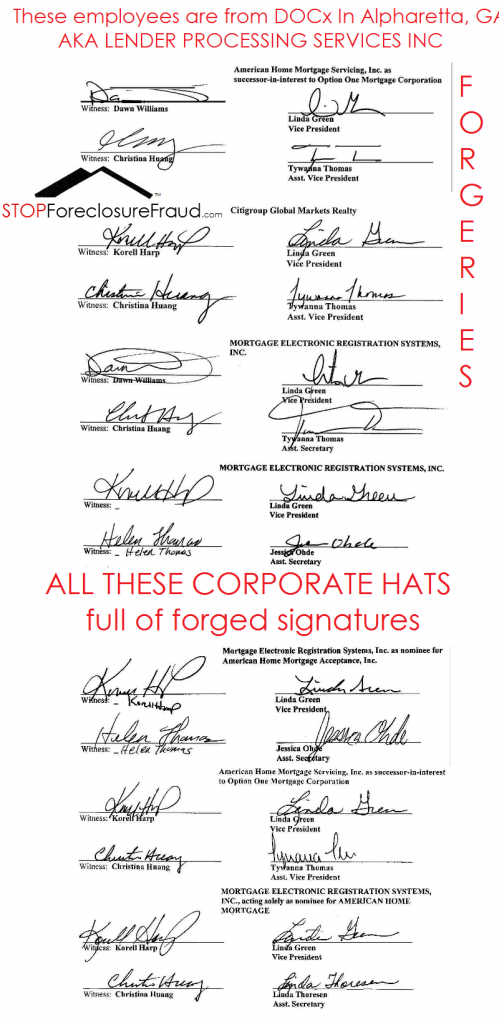
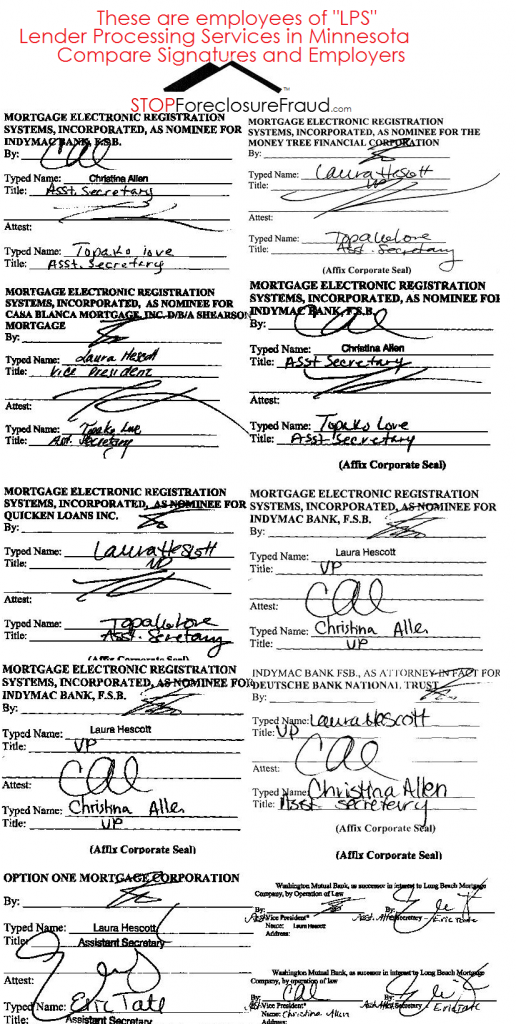
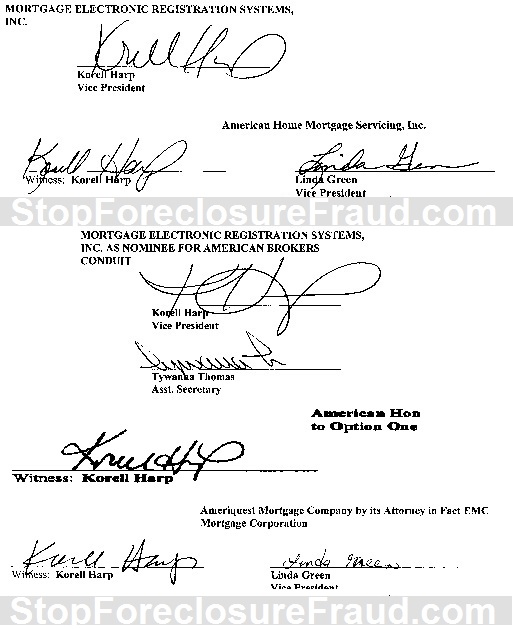


Recent Comments